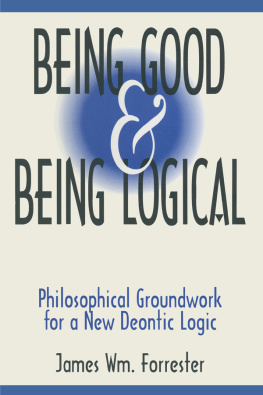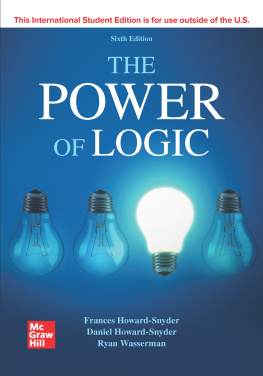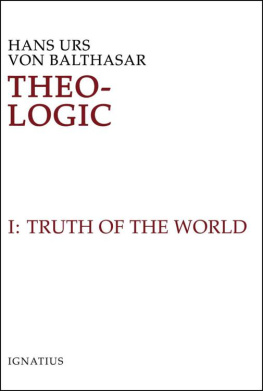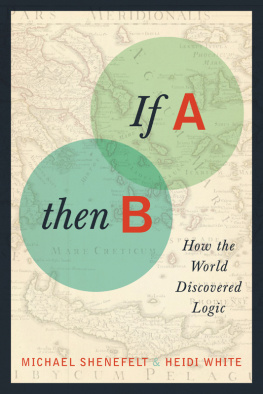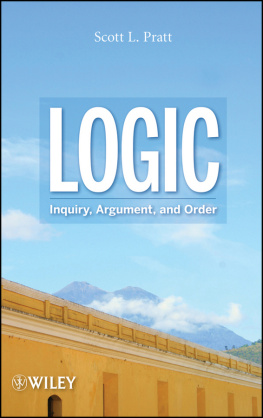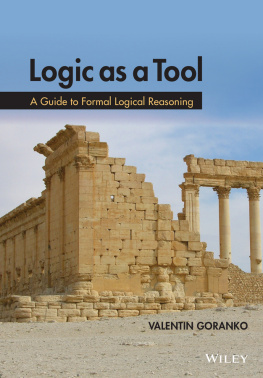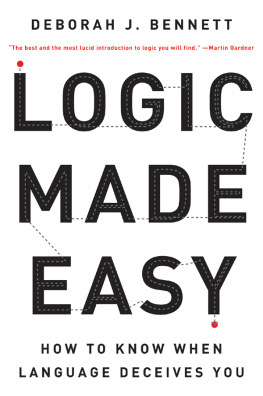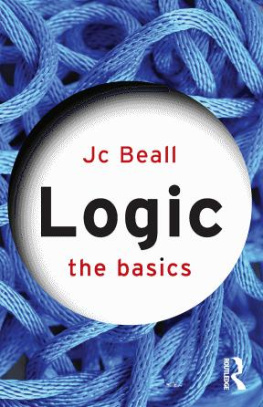T his book, in an earlier form, was my doctoral dissertation. Thus, thanks of course go to my dissertation committee: Stewart Shapiro, Tamar Rudavsky, and Chris Pincock for all of their advisement, criticisms, and help throughout the dissertation process. I would like to especially thank Stewart Shapiro who patiently guided me throughout my graduate career, particularly when I wanted to quit. Thanks also to all of the professors in the philosophy department of The Ohio State University (both current and now elsewhere) who have helped me at every step. Much thanks to my wife Cynthiathe one person who really knows how difficult the whole process of doctoral studies has been for me. I also want to give thanks to my editor Robin Parry at Pickwick. His corrections and suggestions were incredibly helpful, though all remaining problems here are still clearly mine. Finally, all thanks to him who undoubtedly has kept me and blessed me (Numbers :).
Introduction
I n this book I set out to answer the following main question: What is the relationship between God and logic? I argue for an answer to this question by first examining two possible options and then give my own philosophical explanation that I believe overcomes the problems associated with these two options.
In chapter I first define and clarify the desiderata of my main question. I understand God to be the divine being of classical theism shared by Jews, Christians, and Muslims. I understand logic as primarily about the logical consequence relation. I characterize this relation in terms of necessity and universal applicability (or form), which captures various popular intuitions concerning logic. Therefore, my main question is refined to: What is the relationship between the God of classical theism and logical consequence?
In chapter I investigate an ancient question and dilemma presented by Plato in his Euthyphro dialogue, known popularly as the Euthyphro dilemma. I suggest that the structure of this question naturally lends itself to the investigation of my questionwhat I call the logical Euthyphro dilemma, or the Logiphro dilemma for short. As the name suggests, this dilemma gives us at least two options for thinking about the relationship between God and logic: () logical voluntarism: the view that claims the logical consequence relation is the result of Gods commands or will or () logical non-voluntarism: the view that the logical consequence relation is completely independent of Gods commands or will, including being independent of his creating or sustaining power. I then set out to investigate both of these positions each in turn.
In chapter I investigate logical voluntarism. I clarify what the position amounts to and then investigate a few possible historical proponents to see what might motivate this view, including some non-theistic motivations. I then investigate various objections to logical voluntarism, especially focusing on one of these objections and the negative results for accepting the consequences of this objection. I conclude that logical voluntarism cannot provide an answer to my main question.
In chapter I investigate logical non-voluntarism. I clarify what the position of logical non-voluntarism amounts to and note its advantages over logical voluntarism. I clarify that it can be construed either as a Platonist theory (i.e., explicitly appealing to abstract objects) or as a nominalist theory (i.e. explicitly not appealing to abstract objects). I investigate the Platonist version first noting several objections to it from classical theism. I then investigate the nominalist version showing that it is a poor account of logic. I conclude that logical non-voluntarism (both versions) cannot provide an answer to my main question.
In chapter I give my positive account to explain the relationship between God and logic. I first re-investigate the original Euthyphro dilemma and find that the literature discussing this dilemma suggests a third alternative. I suggest that an analogous third alternative is available to the Logiphro dilemma as well. Borrowing from Greg Weltys account of modality and God, which in turn is based upon Aquinas, I argue for a model of logical consequence constituted by mental objects within the mind of God, which I call theistic conceptual logical realism . I conclude that this model explains the relationship between God and logic while overcoming the problems associated with both logical voluntarism and logical non-voluntarism.
The Logiphro Dilemma
An Examination of the Relationship between God and Logic
James C. McGlothlin
The Logiphro Dilemma
An Examination of the Relationship between God and Logic
Copyright 2017 James C. McGlothlin. All rights reserved. Except for brief quotations in critical publications or reviews, no part of this book may be reproduced in any manner without prior written permission from the publisher. Write: Permissions, Wipf and Stock Publishers, W. th Ave., Suite , Eugene, OR 97401 .
Pickwick Publications
An Imprint of Wipf and Stock Publishers
W. th Ave., Suite
Eugene, OR 97401
www.wipfandstock.com
paperback isbn: 978-1-4982-8223-9
hardcover isbn: 978-1-4982-8225-3
ebook isbn: 978-1-4982-8224-6
Cataloguing-in-Publication data:
Names: McGlothlin, James C.
Title: The logiphro dilemma : an examination of the relationship between God and logic / James C. McGlothlin.
Description: Eugene, OR: Pickwick Publications, 2017 | Includes bibliographical references and index.
Identifiers: isbn 978-1-4982-8223-9 ( paperback ) | isbn 978-1-4982-8225-3 ( hardcover ) | isbn 978-1-4982-8224-6 ( ebook )
Subjects: LCSH: God (Christianity) | Logic | Philosophy and religion | Metaphysics
Classification: BT103 M23 2017 ( paperback ) | BT103 ( ebook )
Manufactured in the U.S.A. 09/17/15
To W. Wiley Richards
My first philosophy professor
THE LOGICAL EUTHYPHRO DILEMMA
N ow that Ive clarified how I understand the terms God and logic, we can now focus on the primary question: What relationship exists between God and logic? But how exactly shall we go about investigating and answering this question? In this chapter I will suggest a track of investigation by way of a classic query and problem that is found in philosophical antiquity. I believe this ancient question, and its ensuing dilemma, present a good starting point for approaching how God and morality relate to each other. In addition, I believe an investigation of the structure of this classic question and dilemma will suggest an interesting, analogous way to begin thinking about the relationship between God and logic. In . I will explore this ancient question briefly laying out the problems it presents to any kind of theory that attempts to explain morality in virtue of Gods will or commands. In . I will then attempt to motivate an analogous dilemma structure for our investigation concerning God and logic. As well see, this approach lays out quite nicely at least two options for thinking about what relationship might exist between God and logic. In . Ill try to deflect the objection, or at least the worry, that this sort of approach is a bad way to investigate the relationship between God and logic.
2.1 The Euthyphro Dilemma
Historically, religiously minded ethicists have often sought to ground morality in God, in some way, where God plays some central role in explaining the very nature of morality. There are various sorts of ethical theories that offer such an account, including theological versions of virtue ethics and natural law approaches. However, another way to explain morality in virtue of God, and one that has also been popular among many theists, is that ethics is grounded in the explicit commands, or will, of God. Such an ethical theory claims that morally evaluable entities, of whatever kind, have at least some of their moral statuses in virtue of acts of divine command or will. For example, according to such a theory an act of kindness would be morally good if and only if God had in fact commanded or willed humans to act kind. Such an ethical view is standardly known as some sort of divine command theory . However, divine command theories have suffered a long history of criticisms. Many of these criticisms usually trace back to what is often called the Euthyphro dilemma . In the following section I want to investigate the original, as well as an updated, Euthyphro dilemma and the problems that it poses for divine command theorists.


